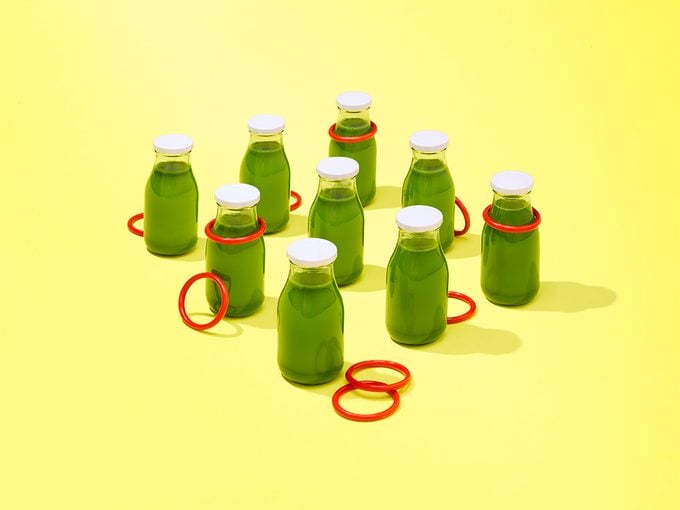Experts Debunk 7 Trendy Diets
Scroll through social media and youre bound to come across a handful of what I ate this week reels, showcasing absurdly neat, insanely colourful plates of food. Im sure Im not the only one to scoff at these posts, and wonder who subsists only on smoothies for lunch or whips up grain-free pancakes every morning. We all know, on some level, that these representations arent a true reflection of how most people eat. Whats more, many posts focus less on health and more on weight loss as their primary goal.(Related: A Dietitian Helps Us Debunk the Outdated Myths About MSG)Melissa Fernandez, an assistant professor at the University of Ottawas School of Nutrition Sciences, says that nutrition influencers in particular play a big role in popularizing fad diets. Its because of how easy it is on social media platforms to visually communicate these plans, foods, trends and ideologies, explains Fernandez. Compared to a cookbook or a daytime TV segment, which is how diets were often pushed in the past, content on social media appears so much more immediateand visceral. Social media algorithms create an echo chamber of diet trendsclick on one and youll be continuously fed new but similar posts. That reinforces the value of these diets, says Fernandez, because you keep on seeing the same messages portrayed in similar ways.Fernandez points out that anecdotal evidencesharing personal experiences with dietsis also a powerful tactic harnessed by influencers because it makes them more relatable to their followers. The diets they push are often conveyed as simple solutions with quick results. They bring in words like well-being and mental health to make it sound more holistic, says Fernandez. But at their core, these eating plans are still either low-calorie, low-carb or low-fat.Nutrition influencers arent necessarily medical professionals. Consumers need to be very critical about what comes up first on their feeds, Fernandez says. The large majority of nutrition influencers dont have any actual expertise in nutrition. And their credentials can be misleading. Consumers assume that a holistic nutritionist is a legitimate title, but anyone could take an online course and become a holistic nutritionist, she explains. They are not licensed health-care professionals. As a first line of defence against nutrition misinformation, look to medical doctors, registered dieticians, pharmacists and nurse practitioners for advice on health, and healthy eating.Nutrition influencers are entrepreneurs, so theyre going to promote ideologies around food that will help build their audience. Fernandez says this often leads to catchy, clickbait-y and sometimes controversial or misleading messaging appearing front and centre because it means more clicks and more followers. They may also promote products and services as part of a paid partnership, which isnt always obvious.It can be hard to discern who to trust and follow in the online food space, especially when not everyone with a large platform is credible. But you can look for red flags. We asked Fernandez, along with two registered dietitians, Acacia Puddester from Mount Saint Vincent University in Halifax and Erin OFlaherty from St. Josephs Healthcare Hamilton, to explain social medias most popular diet trends, and why you should be skeptical of anyone who promotes these eating plans.
Intermittent fasting
Intermittent fasting involves eating during a designated period and abstaining from any food or drink for the rest of the day. For example, someone might consume all their meals during a six-hour window, and fast for the remaining 18 hours. What makes this diet appealing is that it restricts the period of time that food can be consumed, not the quantity or type of food. But OFlaherty says that theres a gender difference in how we respond to intermittent fasting. Womens bodies respond more quickly to food deprivation, releasing more of the hunger hormone ghrelin and decreasing levels of our satiety hormone leptin, all of which can make it harder to stick to a strict eating schedule, compared to men. In addition to those two hormonal changes, the body will also release a neuropeptide Y that stimulates the want for food intake, specifically carbs for quick energyyour body thinks youre starving and goes in search of quick energy.Fasting also affects womens hormones differently. When women are intermittent fasting, our metabolism slows down and the stress in our bodies increases, which affects our hormonal health negatively, OFlaherty explains. Were slowing down to conserve energy. She says that this, in turn, may affect fertility: Were telling our bodies that this is not a good time to make children. Being hungry keeps us in a heightened stateour body is urging us to find food right away.Equally detrimental, according to OFlaherty, are the mental health impacts of intermittent fasting. It can increase the risk of disordered eating because were relying on external cues to tell us when to eat instead of checking in and being intuitive about our hunger or fullness, how much we need to eat and when we need to eat, she explains. Were breaking down that trust between our body and ourselves.
Leaky gut
Gut health has been a buzzy subject lately, for good reason. New research and data show a strong connection between our gut and our mental health, skin health, immune system and more. But leaky gut syndrome in particular is an invented condition that claims symptoms like diarrhea, bloating and fatigue are caused by bacteria and toxins leaking out of the intestinal lining. Its something that Puddester is desperate to debunk. Leaky gut syndrome is not a medical term, she says. Its not a medical diagnosis. It is made up.Puddester says the term has been promoted by alternative health professionals without nutritional or medical backgrounds. She believes it has caught on partly due to self-transformation content on TikTok and Instagram, and the popularity of before and after posts populated with bloated belly images. Fear-mongering plays a role, too. Leaky sounds like something that shouldn’t happen, Puddester says. But, in fact, thats how a healthy digestive system worksits completely normal for your body to absorb nutrients like proteins, fats, vitamins, minerals and water through the small intestine.The symptoms of so-called leaky gut syndrome are pretty common, which is also what drives its online popularity. When people experience these gastro symptoms, and they google them, they see this leaky gut diagnosis, Puddester explains. However, gastrointestinal issues should always be discussed with a dietician or medical professional. It could be the result of celiac disease, irritable bowel syndrome, an e.coli infection or many other factors, she says. Some women experience gastro discomfort during the luteal phase of menstruation, others are particularly sensitive to certain foods, like cruciferous veggies (think broccoli, Brussels sprouts and cauliflower).
Whole30
This 30-day diet cuts out added sugar, alcohol, dairy, dairy, grains, legumes and additives like sulfites (a preservative) and carrageenan (used to thicken food). Fernandez acknowledges that reducing the consumption of sugar and alcohol has health benefits. But eliminating entire food groups, like legumes and dairy, is a red flag. It has the potential to create nutritional deficiencies, she explains. Legumes are a healthy food!Following a Whole30 eating plan might result in weight loss after a month, but Fernandez cautions that the results are short-term. Theres a lot of weight regain after the diet is over, she says. To avoid that, you have to maintain the diet, which is hard to keep up long-term. Fernandez advises following a healthy, flexible and balanced meal pattern instead, like the Canadian or American food guide, or the Mediterranean diet, which encourages eating fruits, vegetables, whole grains, fish, poultry, beans, nuts and vegetable oils while limiting (but not eliminating) high saturated-fat foods like fatty meats, full-fat dairy, sugary drinks and sweets.
Detoxes, cleanses and resets
These diets, which replace meals with vegetable and fruit juices and sometimes proprietary supplements, are marketed as helping your digestive tract absorb nutrients. They might make people feel better in the short term, since they cut out refined sugar and the processed foods that can make us feel bloated. But Fernandez warns that juice cleanses, for example, are really just low-calorie diets in disguise. They might give you 600 calories a day, as opposed to the typical 2,000, for example, Fernandez says. So if youre doing that for a week, youre going to lose weight because youre simply not getting enough calories.Fernandez also encourages us to be critical of any messaging around cleansing toxins from our bodies. The word toxin is used to scare people, she says. It attracts viewers and followers, but it doesnt really mean a lot. There are toxins all around us. There are toxins that are natural in the foods that we eat. And in fact, our livers, kidneys, bladders and skin already do an excellent job at removing them.Laxative-based cleanses are also a red flag for Fernandez. If youre not suffering from constipation, theres no reason to take a laxative, she says. Youre likely dehydrating yourself, and it can have negative impacts on bone health. While some cleanses may claim to be beneficial for gut health, Fernandez says that the opposite is true. It can really disrupt your gut microbiota, she says. If youre eliminating bacteria from your gut, youre eliminating the good and the bad.
FODMAP
Fernandez says that the FODMAP diet, which reduces or limits foods that are high in fermentable carbohydrates such as honey, mango, garlic, beans and dairy, does serve a medical purpose. Its a therapeutic diet for people who have [diagnosed] irritable bowel syndrome, she says. Its quite effective to reduce some symptoms related to IBS and improve patients quality of life. However, Fernandez says, the diet is highly individualized for each person that goes on it: Its usually something thats done under the care of a health-care provider like a dietitian or a doctor. Going rogue and doing a FODMAP diet on your own to cure gastrointestinal issues can exacerbate the underlying problem. Eliminating foods can result in nutritional deficiencies, Fernandez says. Plus, its highly personal as to which items trigger your IBS. First step: talk to your doctor.
Keto
The goal of this high-fat, low-carb, moderate-protein diet is to put your body into a state of ketosis, where you break down fat instead of carbs for energy. Our bodies use carbohydrates for energy, so if we dont have carbohydrates coming in, then our body has to break down something else, explains OFlaherty. The idea of forcing your body to burn fat makes the keto diet sound alluring. The problem is that ketosis is actually a starvation response, she says. It can be dangerous because it changes the acidity of our blood. Another issue is the keto diets high-fat requirement. Not all fats are created equal, OFlaherty says. Ive seen a lot of people increase their cholesterol levels and worsen their heart health following keto eating plans. The diet was originally developed in the 1920s as a treatment for refractory epilepsy (fasting appeared to reduce the incidence of seizures). But it has become so popular in the last decade that keto-specific restaurants have popped up in Toronto, Calgary and Vancouver, and grocery stores stock keto-friendly versions of foods like pizza crusts and burger buns.
No Sugar
Like Fernandez, Puddester cautions against any diet or ideology that eliminates an entire food group or ingredient. Sugar is not bad, she says. Its essential to give us the glucose that our bodies, and especially our brains, need. While reducing excessive amounts of sugar can be beneficial for your health, theres no need to banish it. Fruits are quite high in sugar, but theyre also high in a lot of other nutrients, like vitamins, minerals and fibre, she says. And we certainly dont want to cut those out if they can offer us good health benefits, which they do.A common refrain of no-sugar dieters is talk of being addicted to sugar. But Puddester is quick to dispel this myth. Theres no scientific evidence to show that any food is addictive, she says. The feeling of craving something sweet isnt the same as being addicted to a drug. Really, eliminating any food can result in cravings, according to Puddester. Our bodies will crave because theres a psychological impact: We all want what we cant have. Often, she says, our cravings tell us what were missing. I think its those cravings that make people think, Im addicted, explains Puddester. But its not an addiction. Its your body asking you to not be so restrictive.Fernandez acknowledges that part of what makes any of these diets enticing is that they offer a framework for meal plans, which helps with the burden of meal prep: deciding what to buy, shopping, storing ingredients and cooking. Thats often the hardest part about eating healthy, she says. Having a community support group can help sustain your motivation to choose those whole grains, healthy fats, fruits and vegbut that community doesnt have to be centred on a restrictive diet. Instead, try to connect and share inspiration with friends who enjoy food, and trust your bodys cues.Next: Do Healthy Chips Exist? A Dietitian Weighs In on Our Favourite Healthy Snacks
The post Experts Debunk 7 Trendy Diets appeared first on Best Health.
